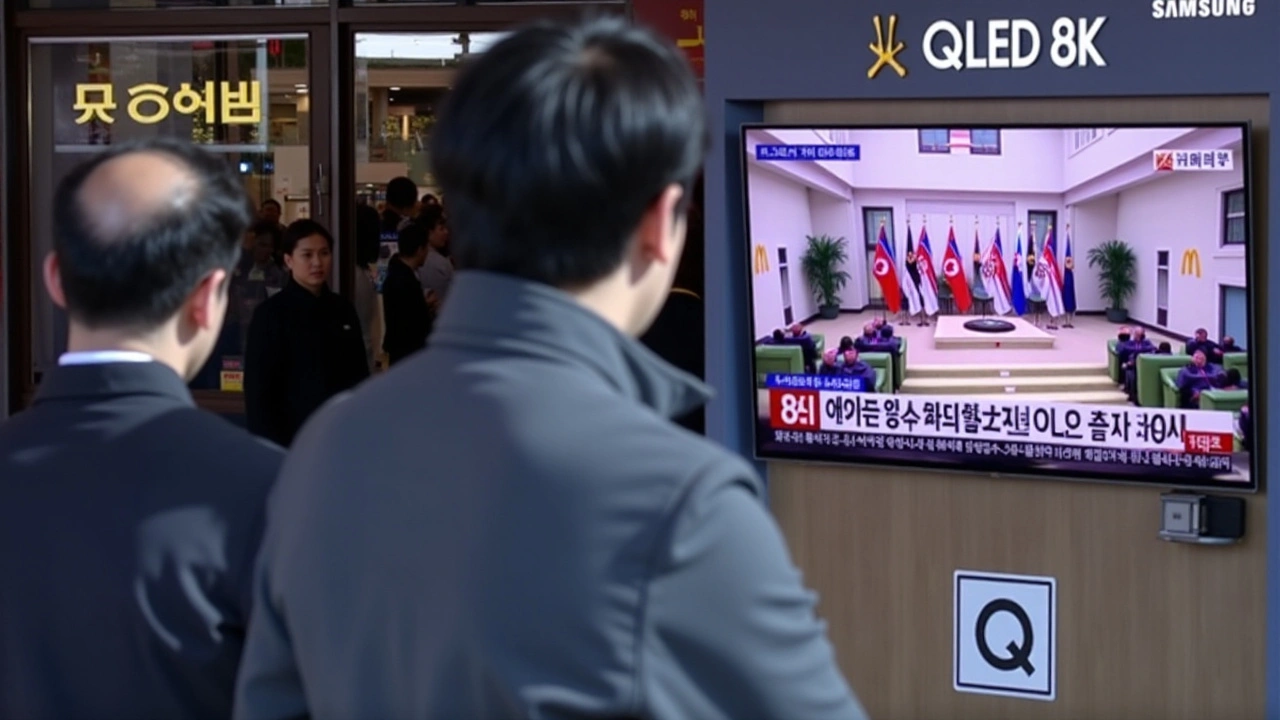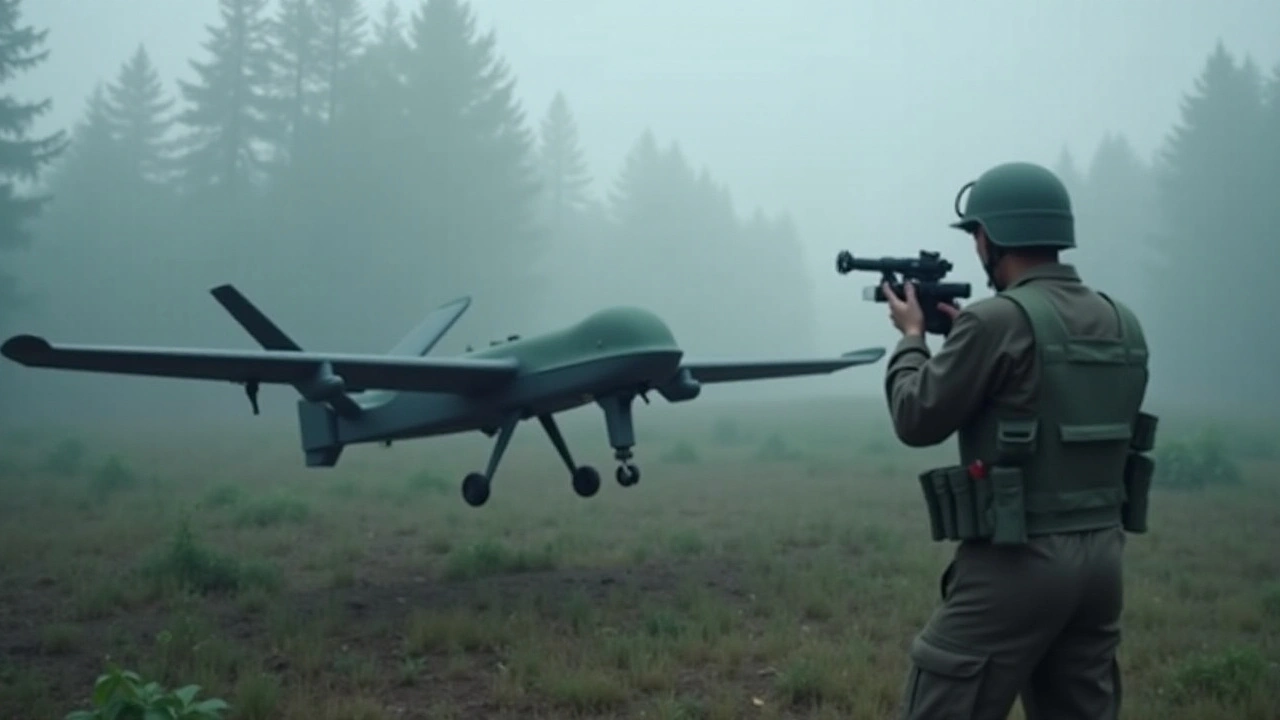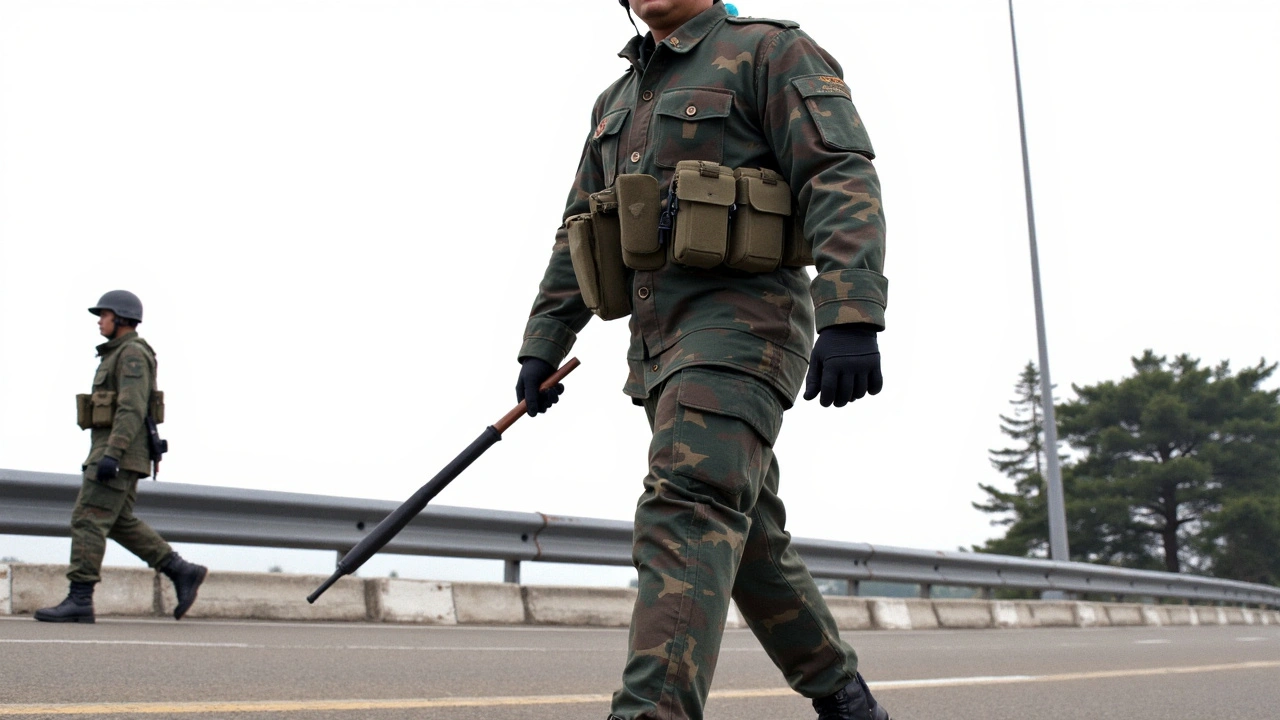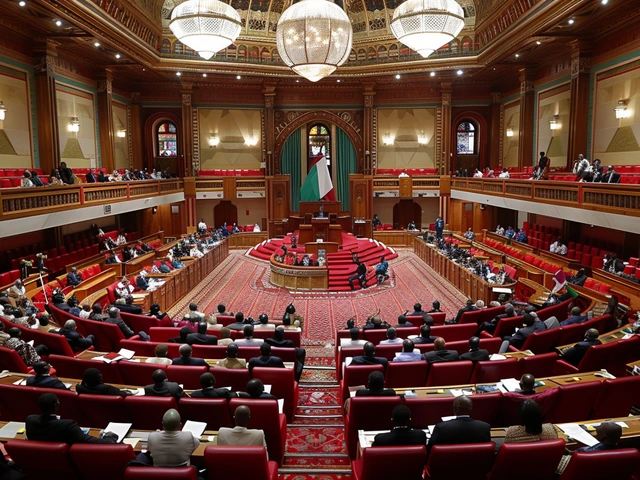The Escalating Crisis
The recent rise in tensions between North Korea and South Korea has once again brought the precarious stability of the Korean Peninsula to global attention. North Korea, known for its often unpredictable diplomacy, has issued a dire warning that any further alleged incursions by South Korean drones into its airspace could result in a formal declaration of war. This announcement follows the supposed discovery of debris from what North Korea claims was a South Korean military drone within its borders. The incident feeds into a narrative of hostility that has been nourished by years of historical animosity and recent provocative actions on both sides.

Roots of Conflict
The animosity between North and South Korea is deeply rooted in the Korean War, which began in 1950 and ended in 1953 with an armistice, but not a peace treaty, leaving the two Koreas technically still at war. The division of Korea at the 38th parallel has since witnessed occasional military skirmishes and numerous political tensions. Events like the recent allegation about drones entering North Korean airspace serve as reminders of this fragile ceasefire.
Drones and Balloons
This latest incident began when North Korea accused South Korea of operating drones over Pyongyang on three separate occasions this month. In response to these alleged incursions, Pyongyang has promised severe military responses, framing such actions as provocations against its sovereignty. South Korean lawmaker Yu Yong-weon indicated that the drones in question were likely produced by Sungwoo Engineering, a domestic manufacturer, although South Korean officials remain tight-lipped. However, the South Korean Defense Ministry appears staunchly dismissive, refusing to be ensnared in what they see as potentially unfounded claims intended to provoke an international incident.
Propaganda and Psychological Warfare
The power play between these two nations took a decisive turn earlier this year when North Korea launched balloons filled with waste into its southern neighbor's territory. This bizarre and seemingly immature tactic was met by South Korea's decision to resume loudspeaker broadcasts that blare propaganda across the Demilitarized Zone (DMZ), a tactic infamous during past confrontations. This tit-for-tat battle is emblematic of the psychological warfare often used by both Koreas to destabilize their opponent’s morale.

International Implications
The threats from North Korea come against a backdrop of wider international ramifications. This month, North Korean leader Kim Jong Un underscored his willingness to utilize nuclear forces if conflicts with South Korea and the United States escalate. The contentious issue of nuclear weapons remains a substantial factor in international relations, significantly impacting U.S. military presence in the region. Approximately 28,500 U.S. troops are stationed in South Korea to serve as a deterrent against potential northern aggression. This military partnership is part of the South Korea-U.S. deterrence strategy, designed to merge conventional and nuclear action capabilities in response to the persistent nuclear threat posed by North Korean efforts.
Global Reactions
North Korea's threats are not only reshaping regional dynamics but also influencing global perceptions. A report from the Chicago Council on Global Affairs indicates that more than half of Americans support potential military intervention should North Korea initiate an invasion. This support reflects growing concerns about instability in Northeast Asia and underscores the global significance of maintaining peace on the Korean peninsula.

Looking Ahead: A Critical Juncture
As stakeholders watch the situation develop, the world remains apprehensive. While the South Korean government continues to tread cautiously, avoiding direct acknowledgment of responsibility or blame, the crisis highlights the enduring volatility that South Korean and North Korean dynamics can invoke. Analysts and politicians worldwide emphasize the urgent need for diplomatic channels to remain active—even as North Korea’s rhetoric grows more belligerent. Optimism for defusing tensions hinges on the powers of diplomacy and international cooperation, advocating for strategies that prioritize peace over aggression. Only time will tell if the current drumbeats of war will amplify or fade into the background, leaving space for dialogue and reconciliation to take precedence.






Surya Shrestha
October 20, 2024 AT 22:51The current escalation, while ostensibly rooted in the specific drone incursions, must be contextualized within the broader geostrategic calculus of the peninsula; indeed, the rhetoric employed by Pyongyang serves both domestic propaganda and external signaling purposes. Moreover, the historical armistice, though technically still in effect, has been repeatedly tested by provocations ranging from artillery exchanges to psychological operations. Such a pattern underscores the necessity for calibrated diplomatic engagement, lest inadvertent miscalculations precipitate a full‑scale conflict. Consequently, regional stakeholders, particularly the United States, ought to reaffirm deterrence postures while simultaneously pursuing confidence‑building measures. In sum, the situation demands both vigilance and restraint, balanced by a nuanced appreciation of the underlying power dynamics.
Rahul kumar
October 31, 2024 AT 19:27Yo guys, the drone drama is real but don’t panic you’ll see it clear soon! South Korea’s tech scene is booming so these little machines are just part of the game. Let’s keep the convo chill and focus on real solutions – talk diplomacy not war!
mary oconnell
November 11, 2024 AT 17:03Ah, the age‑old “who‑dunnit” saga of aerial surveillance, now upgraded with micro‑UAVs and a side of melodramatic propaganda. One can almost hear the think‑tank buzzwords – “asymmetric deterrence”, “gray‑zone tactics”, and, of course, the ever‑reliable “strategic patience”. It’s cute how each side pretends to be the beleaguered victim while stockpiling rhetoric like a kid hoarding Pokémon cards. In the grand chessboard of Northeast Asia, the drones are merely pawns, yet the noise they generate is louder than a startup pitch deck at a venture summit. So, while the headlines scream “war”, the real story is a textbook case of diplomatic theater, complete with script‑ed balloon releases and DMZ loudspeakers. (Insert eye‑roll here.)
Michael Laffitte
November 22, 2024 AT 14:39Honestly, watching this unfold feels like a scene straight out of an epic thriller – the tension, the stakes, the looming thunderclouds over the peninsula. I get the dread, but we’ve seen the world pull back from the brink before, and we can do it again. Let’s channel that collective energy into urging our leaders to keep the hot‑line open, because once that line snaps, the fallout is nothing short of catastrophic. Stay hopeful, stay vocal, and remember: diplomacy, however messy, beats the artillery any day.
sahil jain
December 3, 2024 AT 12:15Hey folks, let’s keep the vibe positive – we’ve got the power to shape the narrative! 🌟 Instead of spiralling into panic, why not amplify calls for calm and constructive dialogue? Every share, every comment that stresses negotiation over aggression adds a brick to the wall of peace. Together we can turn this drone scare into a rallying point for real change. 🙌
Bruce Moncrieff
December 14, 2024 AT 09:51Alright team, the situation’s intense but we can break it down. First, the drone sightings – they’re a symptom of a bigger trust gap. Second, the rhetoric – it fuels fear, so we need facts, not hype. Third, the response – keep pressure on leaders to prioritize talks over tanks. Stay sharp, stay informed, and keep the conversation flowing.
Dee Boyd
December 25, 2024 AT 07:27It is morally indefensible for any nation to weaponize civilian anxieties for geopolitical leverage. The deployment of provocative balloon campaigns and drone incursions constitutes a breach of international norms, undermining the very fabric of regional stability. Such actions betray a reckless disregard for the sanctity of sovereign airspace, and they erode the ethical foundations upon which diplomatic discourse ought to rest. The international community must condemn these escalatory tactics unequivocally and demand immediate de‑escalation.
Carol Wild
January 5, 2025 AT 05:03One cannot help but observe, with a particular measure of bemusement, the cyclical nature of the Korean peninsula’s geopolitical theater, wherein each new technological novelty-be it balloon, drone, or digital broadcast-serves as a mere prop in an ever‑repeating drama of mutual suspicion and orchestrated posturing. The underlying premise, if one is inclined to excavate beyond the veneer of official statements, appears to be a meticulously crafted narrative designed to sustain a perpetual state of alertness among the populace, thereby ensuring a constant market for defense contracts and a justified presence of foreign military assets. It is, in effect, an elaborate feedback loop: provocations beget escalations, escalations beget condemnations, and condemnations beget further propaganda, all while the ordinary citizen remains an unwitting spectator to this grand charade. Yet, let us entertain the notion, however far‑fetched it might seem, that there exists an ulterior agenda-perhaps one orchestrated by shadowy interests embedded within the intelligence apparatuses of major powers-aimed at normalizing a perpetual brinkmanship that precludes any genuine move toward reconciliation. The deployment of so‑called “incursions” is, in this reading, a subtle means of justifying a renewed infusion of resources into the militaristic‑industrial complex, a phenomenon that, while cloaked in the language of security, is fundamentally an economic engine. Moreover, the media’s uncritical amplification of each alleged drone sighting contributes to an atmosphere where fear is commodified, where the populace is conditioned to accept surveillance and militarization as unavoidable facets of modern life. This, in turn, fuels the political calculus of leaders who, cognizant of the electorate’s heightened anxieties, find themselves constrained to adopt ever‑more aggressive postures, lest they be perceived as capitulating to an adversary. The interplay of these forces, as one might surmise, is not merely a product of bilateral antagonism but a sophisticated orchestration involving an intricate web of stakeholders ranging from defense contractors to regional power brokers. Consequently, the persistent drumbeat of warnings, such as the recent threat of war over alleged drone incursions, can be interpreted as a strategic gambit intended to maintain a climate of uncertainty that justifies both increased military readiness and the continued presence of foreign troops. It is worth noting, too, that the very terminology employed-“incursions,” “provocations,” “declarations of war”-carries with it a gravitas that elevates routine incidents to existential threats, a linguistic maneuver that resonates deeply within the collective psyche. In the broader context, one might argue that this perpetual state of near‑conflict serves the hidden interests of those who profit from the perpetual transformation of diplomatic tension into fiscal opportunity. When the public discourse is saturated with alarmist rhetoric, the path of escalation becomes not only conceivable but, for many, inevitable. It is, therefore, incumbent upon discerning observers to peel back the layers of official narratives, to interrogate the motives that lie beneath the surface, and to recognize that the true battle may not be fought on the skies above the peninsula but within the corridors of power where policy is shaped and profit is made. In this light, the current flare‑up over alleged drone activity is less an isolated incident and more a symptom of a deeper, systemic condition that thrives on the perpetual maintenance of a geopolitical status quo that benefits a select few at the expense of broader peace and stability. The onus, then, falls upon the global community to demand transparency, to press for verifiable facts, and to resist the seductive allure of fear‑based narratives that have, for too long, dictated the rhythm of international relations on the Korean peninsula.
Rahul Sharma
January 16, 2025 AT 02:39While the preceding exposition admirably dissects the multifaceted incentives underpinning regional tension, it remains essential to underscore the cultural dimensions that often become eclipsed by strategic calculus; the Korean peoples, both North and South, possess a shared heritage that transcends the politicized narratives perpetuated by external actors. Accordingly, any durable resolution must engage not only diplomatic channels but also grassroots cultural exchanges-heritage festivals, joint academic collaborations, and bilateral media initiatives-that cultivate mutual understanding and humanize the “other.” This holistic approach, coupling hard security measures with soft cultural diplomacy, offers a pragmatic pathway toward de‑escalation, lest we allow the perpetuation of conflict to become an immutable facet of the peninsula’s identity.
Emily Kadanec
January 27, 2025 AT 00:15Honestly, this whole drone hype is more noise than substance.